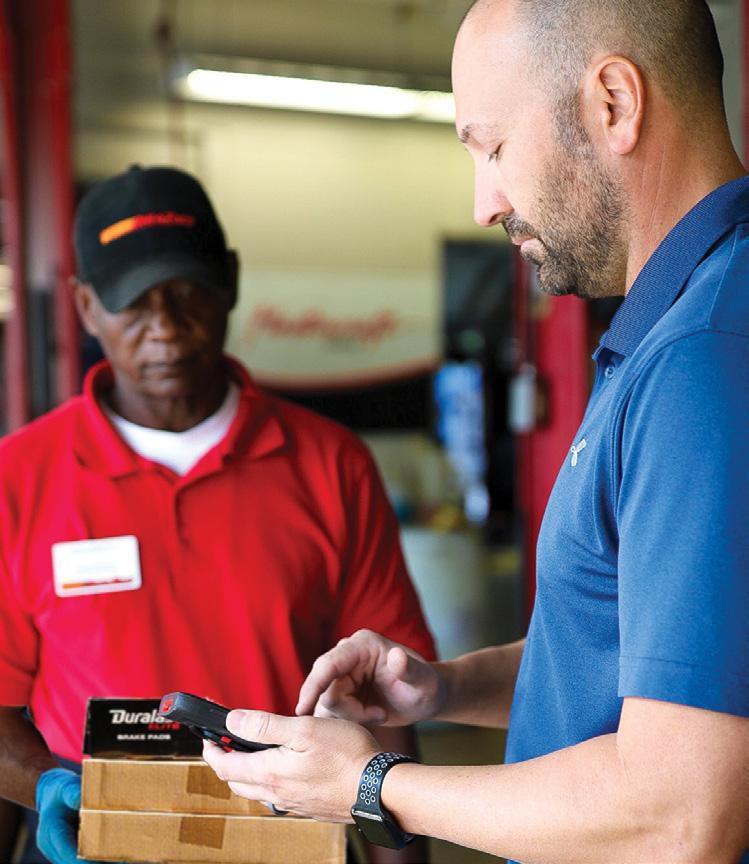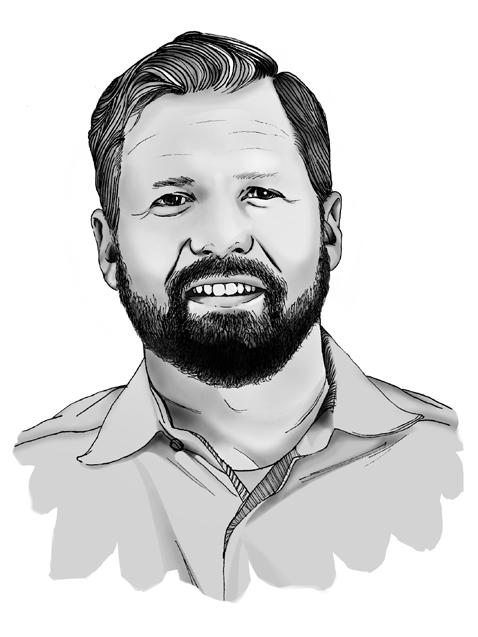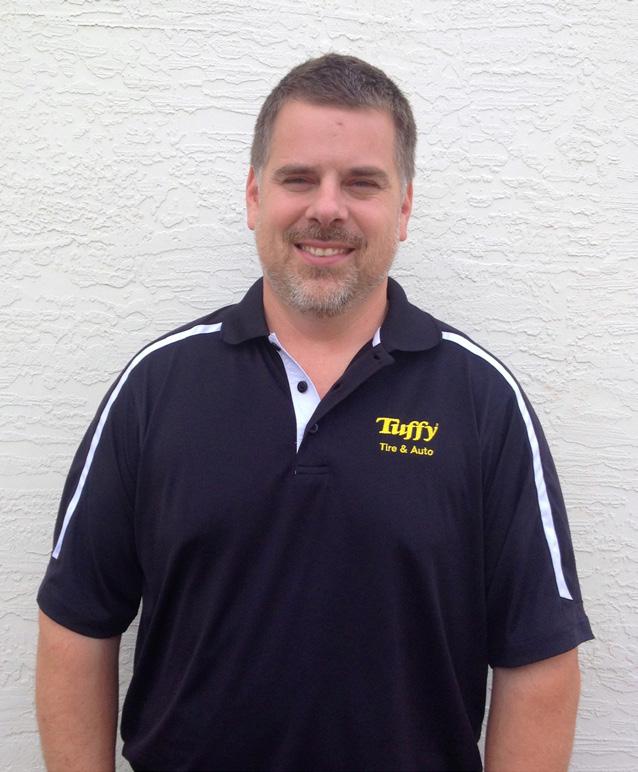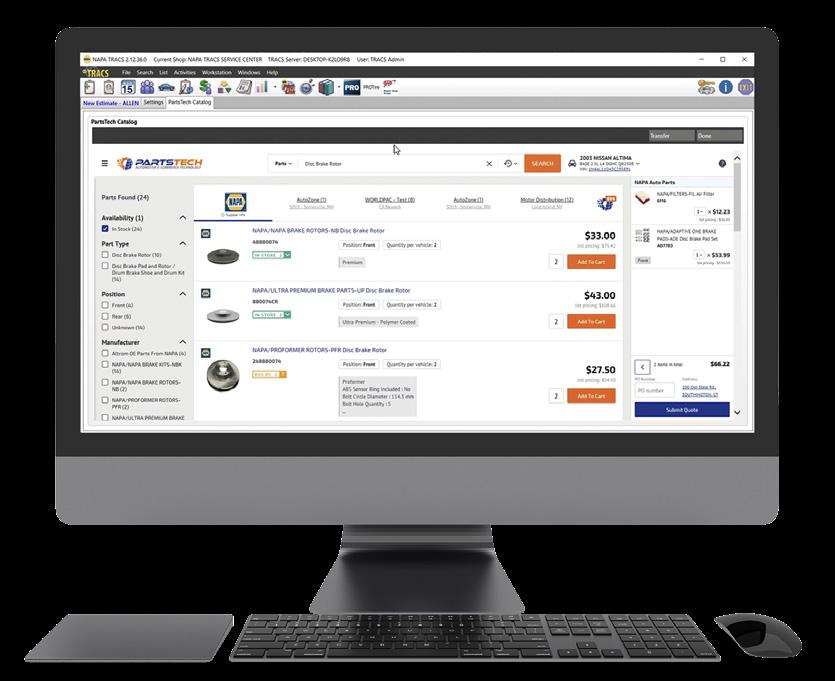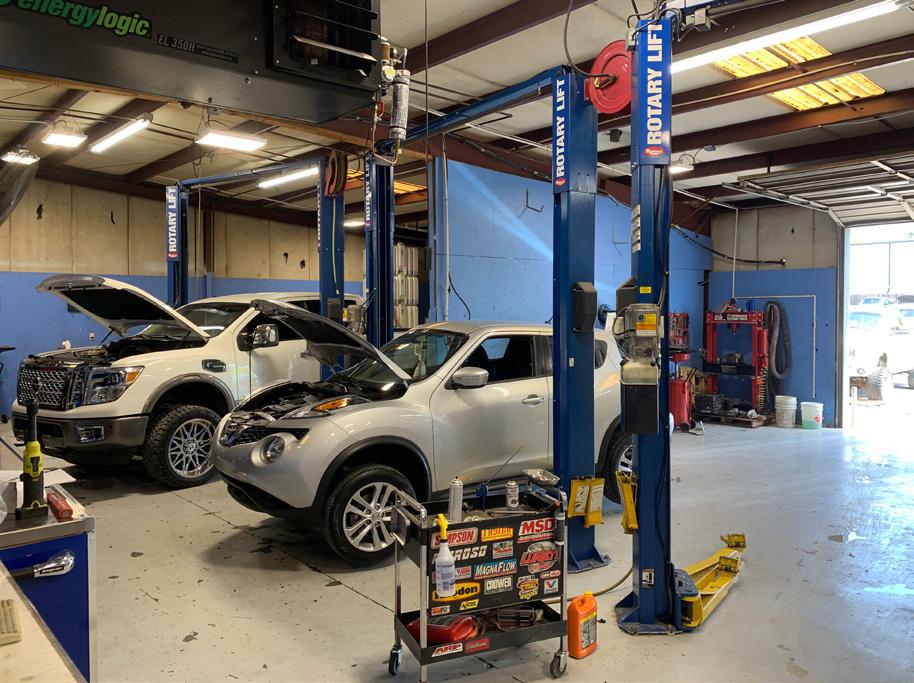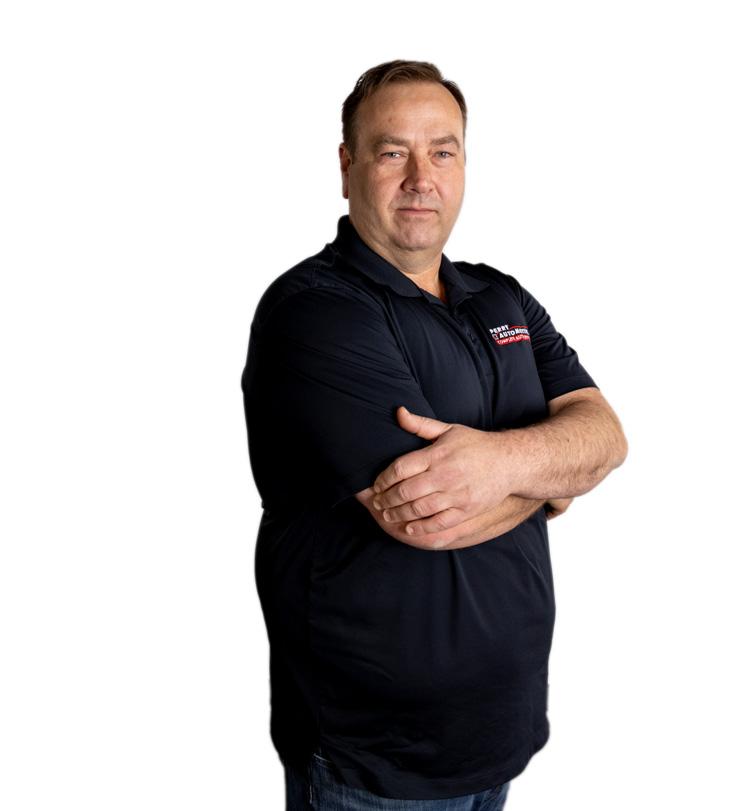
21 minute read
STRAIGHT TALK

from Ratchet+Wrench - May 2021
by EndeavorBusinessMedia-VehicleRepairGroup
Columns STRAIGHT TALK
Joe Marconi
MONEY ISN’T THE MOTIVATOR
We need to see that the toolbox is always the last to leave
Roughly six months ago, Tom, an equipment sales rep, suggested that I speak with his friend Matt (not his real name) who works at a BMW dealership.
Matt is a Master-level tech with 18 years of experience and not happy at the dealership. As a general rule, I make it a point to build a network with people in the industry, but with COVID-19 and because Matt lived quite a distance from me, I put the conversation on the back burner.
Whenever Tom came to the shop, he’d put in a reminder. But I kept procrastinating. Finally, Tom cornered me in my office, dialed Matt’s number, and handed me his phone. After a minute speaking with Matt, it became obvious why Tom wanted me to meet him. Just by the way he spoke, it was clear he was someone with whom I needed to sit down.
Matt and I met the following Saturday. I gave him a tour of my shop and we headed to my office to chat. This was a casual meeting with no intentions of hiring—networking in its truest form. The more he spoke, the more I listened. There was not a bit of arrogance in his demeanor, only confidence and modesty, accompanied by a wealth of knowledge.
After an hour, I said, “I hear you are not happy at the dealership. Can I ask you why?” Matt hesitated for a second, then told me why he was not only unhappy, but also disappointed with the auto industry.
“Joe, with all due respect, I don’t know if this industry is for me anymore. I have devoted my life to becoming the best auto tech I can be. I don’t just want a job. I want a career. I bring that attitude to every place I have ever worked. Too many bosses have made promises to me that they never delivered on. From my perspective, the owners of the companies I’ve worked for have no vision of the future, and if they do, they don’t communicate that vision to their employees. The work atmosphere is horrible, with everyone at odds with each other. There’s no unity, only friction. I don’t even think my service manager knows my name.”
He told me his service manager would come out of his office once or twice a month, and when he’d approach Matt, he’d gaze at the name on Matt’s uniform and say something like, “Matt, great job. keep it up. Thanks,” then walk away. One day, when Matt saw the manager out on the shop floor, he removed his uniform shirt and when his manager approached and said, “Hey, ah, great job today. Thanks,” Matt instantly knew his manager didn’t know his name.
Matt has worked at five different dealerships over the course of his career, not because he wanted to change jobs, but because he was recruited. Each employer made promises and painted a perfect image of the ideal workplace, but Matt was let down each time.
As he spoke, I could sense the emotions and the toll his experiences have had, and to think he’s not sure he wants to stay in this industry anymore really bothers me. Here we have a Masterlevel tech, dedicated to his profession, a family man with two kids, in the prime of his career. He has every certification for BMW, Porsche, Audi, and Mercedes and is also an ASE Master-level tech. Sadly, his experiences and the actions of certain superiors have caused deep emotional scars.
We hear these stories all too often. How many times have you heard, “He left to work somewhere else for ... less money?” That’s because people don’t work for companies, they work for people. And throwing money at people is not the motivator we think it is.
While Matt’s is a dealership perspective, the lessons here are many. There’s a lot of talk these days about finding quality people. To be successful, we need the best of the best employed at our shops. But once we hire them, our job just begins. We must take care of them, mentor them, coach them and help map out their future. We also need to create a healthy workplace. Shop owners have an obligation to everyone employed at their business. We must fulfill this obligation each and every day. If we don’t, trust me, once the heart is gone, it won’t be long before the toolbox is out the door.
Joe Marconi has more than three decades of experience in the automotive repair industry. He is the owner of Osceola Garage in Baldwin Place, N.Y., a business development coach for Elite Worldwide and co-founder of
autoshopowner.com.
j.marconi@eliteworldwide.com
ratchetandwrench.com/marconi
Find Your No. 2
Three top shops share how they found their ideal partners to take their businesses to the next level
BY MEGAN GOSCH
A Partnership With Potential
Brian Sump (left) and Phil Carpenter (right) have built a five-location operation through a true tag-team effort.

Launching a business solo is no easy feat,
but finding a talented and trusted partner who can help you grow and expand that business is an odyssey all its own.
As Gino Wickman and Mark C. Winters outline in Rocket Fuel, some of the most successful ventures in modern history have stemmed from collaboration between two key complementary roles: the visionary (those who concept big picture ideas and solutions) and the integrator (those who organize and execute the tasks needed to carry out those ideas). Titans like Walt Disney and Ray Kroc each had a copilot by their side to help guide the company’s vision to new heights, and the same can be said for the teams behind Avalon Motorsports, AutoStream Car Care, and BG Automotive.
While the owners of each have graced the pages of Ratchet+Wrench for their savvy strategies and notable growth, they’ll be the first to tell you they didn’t get there on their own. Each has found a passionate, dedicated and hardworking No. 2 that’s been instrumental in growing the shop’s operations and helping bring the company’s vision to life.
Ratchet+Wrench checked in to learn how those dynamic partnerships came to be and what shop owners should keep in mind when searching for their own No. 2.

Shop: Avalon Motorsports and Urban Autocare Dynamic Duo: Owner Brian Sump and Director of Operations Phil Carpenter
A Leap of Faith
In 2007 Brian Sump, now the owner of Avalon Motorsports and four Urban Autocare locations in Denver, was a solo entrepreneur looking for a skilled technician.
“I knew nothing about the industry and I really needed someone I could rely on to be ethical and precise,” Sump says.
Dealership tech Phil Carpenter, now his director of operations, was his very first hire—taking a 30 percent pay cut to join Sump. Why?
“His energy and his ethics aligned with mine, but he was also upfront about his plans for the company,” says Carpenter. “He cast a vision from day one and explained how I’d be treated as a partner so I could see a career trajectory for myself.”
Between the financial leap of faith Carpenter took in joining the fledgling venture and his dogged performance on the job, Sump knew he’d made the right choice.
“He was committed. He jumped in, took ownership of everything he worked on, and hustled hard,” Sump says. “It was just the two of us for those first few years and he stepped up to every challenge along the way.”
Embrace Evolution
Since taking on his first role as the shop’s sole technician, Carpenter has reinvented himself five times—and he’s fully prepared to pivot again.
While trust and clear communication have been critical in their partnership, both agree Carpenter’s desire and ability to adapt in new roles has been key to the partnership’s sustainability.
“There’s this concept that the person who got you to $1 million isn’t going to be the same person that gets you to $5 or $10 million,” says Sump. “Phil looks at that and says, ‘Maybe I’m not supposed to be the guy that gets us there, but I’m going to prove that wrong.’ He doesn’t see a ceiling.”
That transformation hasn’t always been smooth sailing. The duo both note a moment where Carpenter was confronted with critical feedback from the team he oversaw. Carpenter reflected, committed to changing his leadership style, and later that year when the team launched its first Urban Autocare location, they broke the store’s 20-year sales record under his leadership.
“You need to have someone in that No. 2 spot who’s a lifelong learner and won’t crumble taking criticism,” says Carpenter. “Certainly hustle and drive are important, but to see the business grow you need to have someone in that spot that’s continuously trying to improve themselves.”
Non-negotiable: Stay in your lane.
"As you grow the business, everyone's going to be wearing multiple hats. Defining your lanes and sticking to them cuts out confusion and gives that No. 2 the autonomy they need to actually get things done."
—Phil Carpenter, director of operations, Avalon Motorsports and Urban Autocare
Divide and Conquer
In the early days, Sump learned to write service on the fly while Carpenter tackled repairs, organized the shop, and handled parts inventory and ordering. Today, their complementary skillsets have helped them to naturally fill those integrator and visionary roles.
As director of operations, Carpenter works to develop short-term deployment tactics, oversees each shop’s performance, supports each location’s staff through dayto-day issues, and looks for process and infrastructure improvements, while Sump plans for the company’s future growth.
“Phil’s excellent at creating a vision for a one-week to six-month strategy that will help us accomplish whatever we’re trying to do in the near term, and my vision generally applies to that six- to 12-month range,” says Sump.
Shop: BG Automotive Dynamic Duo: Owner Bryan Gossel and President Philip Christensen
Prioritize best fit.
When BG Automotive owner Bryan Gossel met Discount Tire Company manager Philip Christensen when he began buying through the vendor, it was “love at first sight,” he jokes.
“If you crack a door open I’m going to kick it down to get at that opportunity and Phil’s the same way,” he says. “He’s going to run toward the fire, rather than watch it burn and that was exactly what we needed.”
The pair discussed a BG position for Christensen for nearly two years before he officially signed on. Though Gossel feared he couldn’t afford Christensen’s salary, he believed the growth they could achieve with Christensen by his side would be worth the risk.
Since joining the team in 2012, BG has opened three new locations and grown to 21 lifts and 33 employees.

Find your flow.
Through nearly a decade of partnership, Gossel and Christensen have honed their roles as integrator and visionary by embracing each other's quirks.
Gossel manages the company’s marketing, technology-focused decisions, and research of future acquisitions, while Christensen oversees day-to-day operations.
“Being an integrator is one of the toughest jobs out there. And it has to be the right person in the right seat, or those ideas will fall flat on the page,” says Gossel.
As Gossel crafts new concepts for the company, he talks through his ideas out loud while Christensen, a detail-oriented logistics pro, organizes those ideas to find an anchor for each strategy.
“We’ve come to call it the ‘shotgun effect,’” says Christensen. “We’ve learned how to play off each other so we can brainstorm as a team.”
Adapt to the balancing act.
While both bring a unified attitude, describing each other as positive and high-energy, Gossel’s quick to note their differences have moved the company forward.
“I’m very much a people-pleasing person at heart and I’m making progress on that, but having someone like Phil who isn’t afraid to make the unpopular decision and counterbalances me like that is critical,” says Gossel.
As Gossel works to become more comfortable with conflict and holding others accountable, he knows he can trust Christensen to address issues head-on in real time.
“Of course, you need a No. 2 you can get along with, but I’d say finding someone who fills those gaps and complements your weaknesses is most important.”
Non-negotiable: Define your vision.
“That No. 2 person can really be held back if the owner doesn’t know what they’re hoping to accomplish or the timeframe they want to do it in. You need a vision to work off.”
—Philip Christensen, president, BG Automotive
Welcome a challenge.
Gossel also stresses finding a partner who will challenge you.
“It can be intimidating, but you need someone that’s going to push you, and disagree with you, and poke holes in your plans,” he says.
Christensen notes a strong No. 2 needs to approach the role with a focus on what’s best for the shop, even when it can lead to conflict.
“In anything I put my mind to I’m focused to win, and in this role if there’s something I don’t think will help us in the long run, I’m going to speak up about it,” says Christensen. “At the end of the day it’s about the success of the shop and you’re going to have disagreements, but you have to get comfortable with being uncomfortable to work through it.”
Through the years, Gossel and Christensen have worked to confront disagreements and tough conversations head on.
“There were times where we had the
same vision but it was like we were speaking different languages,” says Christensen. “The more we sat down together to throw ideas around and explain how they fit with the larger goal, the easier it’s been to push each other without running each other over and stay on track.”

to come in and create processes, procedures and make an impact.”
Today Levitan oversees the company’s financing and acquisitions, while Grills develops the company’s long-term strategic goals and participates in a variety of associations and 20 Groups, and Askwith manages day-to-day operations for all locations.
Through the years, as tasks have been divided across each role, the trio has become disciplined in their communication, making sure the correct person is consulted and looped in.
That structure and clear divide has helped Askwith take ownership and execute in his role as an integrator.
“From there I have the freedom and autonomy to go out and deliver results in the ways that make most sense to me,” Askwith says.
Make a serious commitment.
Shop: AutoStream Car Care Dynamic Trio: Owners Doug Grills and Rick Levitan and Director of Operations David Askwith
Trust your gut.
When Doug Grills and Rick Levitan, then the owners of multiple gas stations, stopped into an ExxonMobil convenience store to scope out the merchandise, they were caught off guard by a genuinely friendly David Askwith.
“You’d think a store manager might be more suspicious or standoffish in that scenario, but David was sincere and professional and really wanted to help,” says Grills.
They exchanged business cards with Askwith and two weeks later they called to offer him an interview.
Grills and Levitan hired Askwith as a retail C-store manager and had always planned to hire a No. 2 with years of industry experience, but when the existing manager of service bay operations failed to pan out, Askwith was tapped for his confidence and work ethic to run both the retail and service sides of the business.
“When David sets his mind to something, he’s going to seize the opportunity and do whatever is required to learn and grow to meet the challenge head on,” says Grills. “When you combine those traits, you get a powerful outcome and that ended up being what we were really looking for in that second in command.”
The trio now run six AutoStream Car Care Centers with a total of 37 bays and an annual revenue over $7 million. After working as a tight-knit group for 14 years, Levitan, Grills and Askwith can finish each other’s sentences—a dynamic they’ve worked hard to earn.
“You’ve got to dedicate the face time to learn about each other inside and out,” says Grills. “You have to think of it as something you’re planning to stick with for the long haul. This is a long-term relationship.”
When Askwith officially became director of operations, Grills and Levitan were intentional on training him, and made a point of spending time together to get to know each other away from the business.
“We’ll have a two- or three-day offsite to develop those relationships and get
a feel for each other’s mindsets and where each of us is coming from,” says Askwith.
They may not agree on everything, but like any serious relationship, they know compromise comes with the territory.
“It’s like a marriage and you’ve got to be on the same page and willing to work through the hard times or it’s going to be brutal,” says Levitan.
Non-negotiable: Get results on the board.
"You can work hard, but at the end of the day this job is about results and you are what your record says you are. Ultimately if you're not putting points on the board, it's not a match."
—Doug Grills, co-owner, AutoStream Car Care
Set clear expectations.
With two shop owners, one director of operations, six shops and more on the horizon, Grills, Levitan, and Askwith all stress the importance of defining clear responsibilities for each role.
“Doug and Rick made it clear from day one that their goal was to work on the business,” says Askwith. “They needed me
Complete Career Crossover
After early success as a skateboard star, Alan "Ollie" Gelfand has taken the helm of his own repair shop.

Ollie’s Second Act
From skateboarding to shop repair, Alan Gelfand has found success at every stop
BY PAUL HODOWANIC
Living Legend
Gelfand earned skate world fame as the inventor of the "ollie" trick in the 1970s.

No Quick Fixes
Ollie Gelfand and his team are diligent in their diagnostic process to ensure a thorough repair.

Alan “Ollie” Gelfand will live on forever. Or at least his name will. Listed in The Merriam-Webster Dictionary as “ollie,” Gelfand created the patented skateboarding jump in 1977, a famous maneuver in which a skater kicks the tail of the board down while jumping in order to make the board pop into the air.
But Gelfand prefers to think of himself as “the most famous skateboarder nobody knows.”
He didn’t transcend the sport. He doesn’t have 10-plus million followers on social media or a video game created in his name like Tony Hawk.
Over 40 years later, Gelfand lives a quiet life in Hollywood— Hollywood, Fla., that is—and owns his own repair shop, the German Car Depot. Even that doesn’t have his name on it.
Most customers have no idea who he is until they see the memorabilia inside the shop. But make no mistake, his roots as a skateboarder can be seen on more than just the walls of his shop. In every aspect of Gelfand’s business, his past shines through. His roots as a skateboarder laid the groundwork for his successful second act.
GERMAN CAR DEPOT
Location: Hollywood, Fla. Size: 5,000 square feet Staff: 8
Bays: 8
Average Monthly Car Count: 220
Annual Revenue: $1.3 million Always Learning
Gelfand is used to getting help from experts. In his early days as a skater he worked with Stacy Peralta, a prominent skater in the ’80s turned coach/entrepreneur. Peralta coached famous skaters like Hawk and Mike McGill. He was one of the first people that saw Gelfand pull off the ‘ollie’ and helped him become one of the top athletes in the sport.
As a shop owner, that desire to learn hasn’t left. Gelfand is adamant about the need to surround yourself with smarter people. He says nowadays, “you better be super intelligent or special to run an automotive shop without having proper support.”
Gelfand has a mentor, Tom Ham, who has been in the auto industry over 50 years and has helped Gelfand’s shop achieve its most profitable times. He also has a coach, Bill Haas, who has 40 years of experience in the business and operates his own consulting firm. And the expert guidance isn’t just for Gelfand.
“I think it’s really important for everyone to have coaches. You can’t have too many of them.”
For his service providers, Gelfand brings in Jeremy O’Neal, a renowned trainer in the Los Angeles area, who helps train his employees all the technical skills they need. He also employs an efficiency expert, who works with the providers to make sure everything runs smoothly. Gelfand likens it to Formula One and NASCAR, which have analysts watching the moves of every person on the pit crew, finding ways to make them faster. Gelfand hopes he can bring that, on a much smaller scale, to his shop.
Roll With the Punches
Ollie Gelfand's resiliency has prepared him for the twists and turns that come with running a business.

Always Adapting
Ollie Gelfand’s start in the auto repair business wasn’t planned. After he ended his career as a skater, he needed a new path. He grew fixing things, cars were his favorite to fix. And he wanted to keep the adrenaline he had from skateboarding. So he turned to racing.
Throughout the 1980s and ’90s, Gelfand was working full-time fixing, building and successfully racing Volkswagens in professional competition. But when the main source of financial banking pulled out, Gelfand suddenly had a team of fulltime employees working in a shop designed for racing cars without a direction. So the team began buying and selling Volkswagens. That went on for several years before he adapted it to a repair shop and VW Depot was born.
“It was an accident,” he says about the starting of the shop. “But I’ve always been about solving problems. That was a solution to a problem.”
In 2007, he was forced to adapt again when Volkswagen and Audi sued the shop for its name, VW Depot. So Gelfand changed it to what is now, German Car Depot, and was ordered to pay a substantial fine, roughly $100,000 for the infringement. To recuperate the cash, Gelfand wrangled up spare tools, parts and anything he could find in the 15-year-old shop and went to eBay. For a few months, they made $60,000 per month selling equipment online.
“That’s how I paid off all the fines,” he says. “Always find a way to get it done.”
A year earlier, following an incident with a Shell Motiva refinery that mistakenly put too much sulfur in the gasoline and caused mass fuel system failure in the area, Gelfand quickly reacted and dubbed his shop “the official Shell Motiva repair facility.” He subcontracted out the work for non-Volkswagen vehicles and made thousands of dollars a day fixing fuel systems. The money he made from that went into the building of his newest shop.

Always Working
Gelfand remembers his skateboarding days fondly. He'd be the first to arrive in the morning at Skateboard USA, a park in his hometown of Hollywood, Fla., and would only leave when his mother forced him to come home for dinner. It was there he would perfect the “ollie” and develop a work ethic that has stuck with him to this day.
Knee injuries and burnout pushed Gelfand away from skating in 1980 and towards his racing days, but his “all-in” habits stayed with him. Gelfand estimates he competed in between 10-15 24-hour races during his time as a professional, finishing first or second in all of them. He remembers not sleeping for several days before every race to ensure the car would be ready. Gelfand and his crew built the cars from the ground up and often faced cars with much bigger engines and firepower. To compensate, Gelfand and a close friend from his skating days, who happened to have a PhD in mathematics, calculated the most efficient way to run the car to maximize its power. They brought their car parts to a facility that tested aircrafts to make sure they’d hold up during the course of the race and they constantly tried new strategies to help them keep up.
“We methodically went through everything,” Gelfand says. “And somehow we pulled it off.”
As a shop owner, Gelfand’s self-described “OCD” tendencies are still present. Gelfand is obsessed with understanding how customers find his shop and how he can increase the shop's digital footprint. He’s constantly parsing through his Google Analytics and advertisements, searching different terms to make sure his SEO is performing exactly to plan. He often gets up in the middle of the night to research the shop’s online presence and track its performance, much to the chagrin of Gelfand’s girlfriend.
“She didn’t like it too much,” Gelfand says with a chuckle, reminiscing a night when he was on the computer from 3 a.m. to 1 p.m.
Inside the shop, the goal for his team is to make sure every customer's problem is not only fixed, but will also never happen again. It’s what Gelfand likes to call “forensic auto repair.” There are no quick fixes for his team as they often spend more time diagnosing the underlying issues of malfunction than actually fixing it.
And much like the ollie, which marries athleticism, balance and grace, Gelfand and his shop’s persona are perfectly synchronized.
Hardworking, under-the-radar, but undeniably confident.



